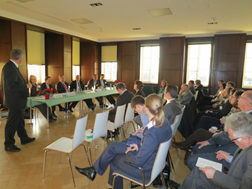Transfer-Workshop STROM
Strom-Workshop: Market success of alternative drivetrains in Germany and China
 The market penetration of alternative drivetrain technologies in Germany & China, and the accompanied economic and environmental impacts until 2030 were analyzed in the BMBF-funded STROM-Project during the past three years. Results of the project and further gripping issues regarding sustainable design of individual mobility have been discussed within the transfer-workshop "Market success of alternative drivetrains in Germany and China - when and why?" at the "Haus der Wissenschaft" in Braunschweig on December the 16th, 2013.
The market penetration of alternative drivetrain technologies in Germany & China, and the accompanied economic and environmental impacts until 2030 were analyzed in the BMBF-funded STROM-Project during the past three years. Results of the project and further gripping issues regarding sustainable design of individual mobility have been discussed within the transfer-workshop "Market success of alternative drivetrains in Germany and China - when and why?" at the "Haus der Wissenschaft" in Braunschweig on December the 16th, 2013.
After an introduction on the topic of the market development of alternative drivetrain technologies by Prof. Dr. Thomas S. Sprengler, who is the STROM project manager, interested parties from science and practice had the opportunity to hear information about sustainable mobility concepts in general and particularly regarding the Volkswagen group, within an expert-talk by Mr. Dr. Schmerbeck of the Volkswagen Ltd.. The project workers, Laura Hombach (RWTH Aachen University), Mark Mennenga (Technische Universität Braunschweig) and Katharina Wachter (Technische Universität Braunschweig), subsequently presented the results of the STROM-Project. The discussion forums, which took place in the afternoon, offered the opportunity to discuss urgent issues regarding the different aspects of the mobility design in changing groups. In conclusion, there was a panel discussion with the participation of Miriam Palandt (Niedersächsisches Ministerium für Wirtschaft, Arbeit und Verkehr & Landesinitiative Mobilität), Dr. Harald Braun (Daimler Group), Harry Evers (IST Niedersachsen & Landesinitiative Mobilität), Dietmar Oeliger (Nature And Biodiversity Conservation Union) as well as Dr. Stefan Schmerbeck (Volkswagen Group). The discussion of questions of the prospective design of individual mobility from the customer's, the automobile manufacturer's and the politics' view was central. A detailed report of the panel discussion can be found at the Braunschweiger News (Here's the report (in German)).
Altogether participants and organizer can retrospect on a day full of new ideas and incentives. Consensus dominated especially to the effect that an establishment of alternative drive train technologies is necessary for the sustainable design of individual mobility, that however the coexistence of different technologies (from gas-driven vehicles right up to fuel cells) and not the own-age of just one technology is expectable. Further on, numerous gripping insights how politics and industry can enable a sustainable design of individual mobility through an approval promotion of innovative drive train technologies and through a corresponding design of the prevalent general framework can be gained - not only in Germany but also in emerging markets (e.g. PR China).
The project was promoted in the research focus "Economics for Sustainability (WiN)" by the BMBF from 2010 until 2013. Assistants of the RWTH Aachen University, the Technische Universität Braunschweig and the Volkswagen Group were involved.


